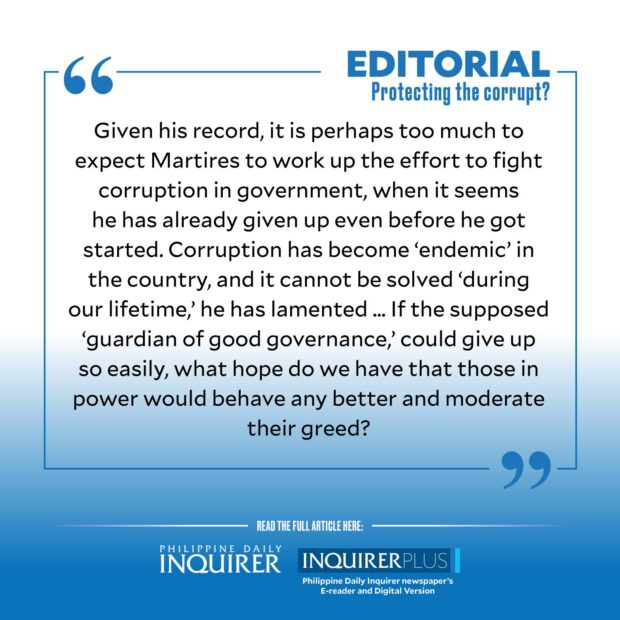The Irony of the Ombudsman and the Erosion of Transparency in Government
It is quite ironic that the Ombudsman, whose primary duty is to ensure the accountability of government officials, appears to be undermining the legal measures put in place to expose corruption. In a surprising move, Ombudsman Samuel Martires suggested that Congress remove a provision in the annual national budget that requires the publication of Commission on Audit (COA) reports on government agencies. Martires argued that the publication of these reports is causing confusion and potentially prejudicing those who are flagged by the auditing agency.
During the presentation of the Office of the Ombudsman’s proposed budget for 2024, Martires faced scrutiny from members of the House appropriations panel. Under the General Appropriations Act, government agencies are mandated to publish their annual reports, audited financial statements, and COA reports on their websites within 60 days, allowing them to comment if any irregularities are found by the audit agency. These COA reports are vital tools in the fight against corruption, as they reveal how public funds and property are utilized or misused by government agencies and controlled corporations.
House Deputy Minority Leader Rep. France Castro emphasized the importance of publishing COA reports, stating that it is one of the few ways the public can verify if their hard-earned money is being used properly. Like the publication of the statement of assets, liabilities, and net worth (SALNs) of public officials, the audit observation memorandum serves as a transparency and accountability mechanism for public servants.
After facing public backlash, the Office of the Ombudsman released a statement clarifying that they are not protecting corrupt government officials and employees with Martires’ proposal. However, Ibon Foundation executive director Sonny Africa pointed out that Martires has consistently reduced transparency in government, contradicting his role as the country’s top graft buster.
In previous budget hearings, Martires advocated for severe penalties, including imprisonment, for anyone who commented on the SALNs of government employees, claiming that these documents were being weaponized to destroy reputations. He also restricted media access to SALNs, despite them being required by law under Republic Act No. 6713. As the custodian of these documents, the Ombudsman is responsible for making them accessible to all Filipinos, as public office is a public trust.
Martires even admitted that his office has not conducted any lifestyle checks since his appointment in 2018, citing confusing and illogical provisions in the law establishing a code of conduct and ethical standards for public officials. Additionally, he argued that his office does not need to account for confidential funds, despite clear guidelines on their use and audit. This faith in the integrity of government officials may explain the declining conviction rate of the Office of the Ombudsman.
According to Batangas Rep. Gerville Luistro, the conviction rate dropped from 61.2% in 2020 to 42.7% in 2021 and a mere 26.5% in 2022. Martires blamed the lower conviction rate on the amended jurisdiction of the Sandiganbayan and dismissed it as an unfair measure of their competence. This track record raises doubts about Martires’ commitment to fighting corruption and leaves little hope for improved behavior and accountability among those in power.
Martires has even expressed his belief that corruption is endemic in the country and cannot be solved in our lifetime. He claims that tackling corruption requires the passage of a new law mandating the teaching of “God-centered” good manners and right conduct, rather than enforcing existing laws.
In conclusion, the erosion of transparency in government, caused in part by the actions and proposals of the Ombudsman, is a concerning development. It hampers the fight against corruption and raises doubts about the integrity and accountability of public officials. It is imperative for the Filipino people to demand transparency and uphold the principles of good governance.
Subscribe to INQUIRER PLUS for the latest news and information. Gain access to The Philippine Daily Inquirer and over 70 other titles, share up to 5 gadgets, listen to the news, download articles as early as 4 am, and share them on social media. Contact us for feedback, complaints, or inquiries.
Denial of responsibility! Vigour Times is an automatic aggregator of Global media. In each content, the hyperlink to the primary source is specified. All trademarks belong to their rightful owners, and all materials to their authors. For any complaint, please reach us at – [email protected]. We will take necessary action within 24 hours.


